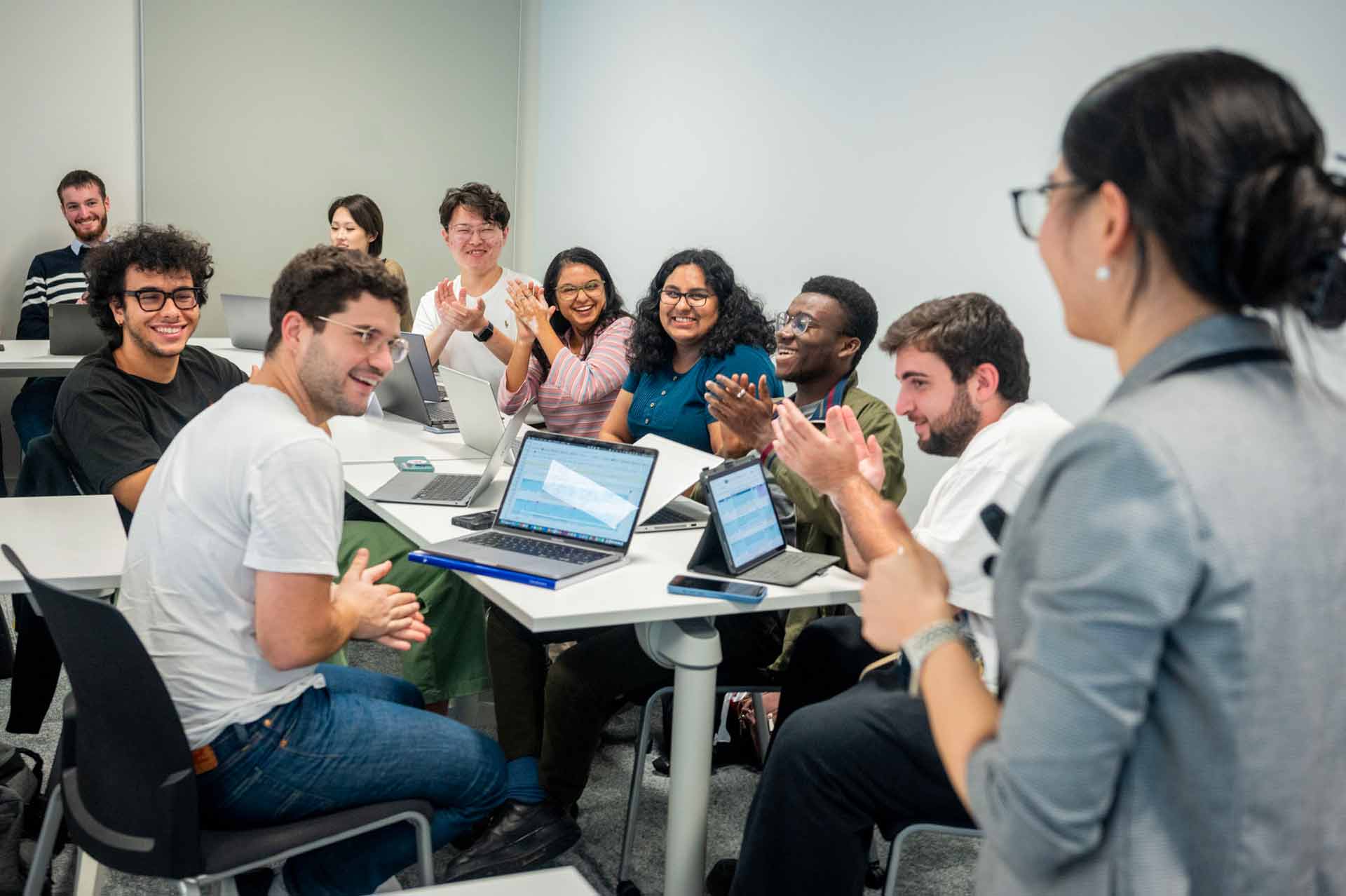A teaching model in tune with the world
In a context of social and ecological emergencies, geopolitical crises, information warfare, technological breakthroughs, etc., emlyon business school's purpose is to “train and provide lifelong support to enlightened individuals who can effectively transform organisations to create a fairer, more caring society that respects the planet”.
The challenge is to train people capable of undertaking change by drawing on the most advanced scientific knowledge, and knowing how to connect disciplines, blend perspectives, cultures, skills and different visions of the world. emlyon, a major player in higher education, aims to resonate with all the stakeholders in its ecosystem: students, alumni, businesses, public authorities, teacher-researchers and citizens, and to nurture connections between :
As a higher education leader, emlyon's ambition is to resonate with all the stakeholders in its ecosystem: students, alumni, businesses, public authorities, teacher-researchers and citizens, and to nurture connections between:
the academic world and the socio-economic sphere ;
research and the dissemination of scientific knowledge in training programmes and in society at large ;
students and the professional world ;
territories and international organizations.
The action-based teaching philosophy
“Do to learn,
learn to do”
The "maker" spirit has been part of emlyon's DNA since its creation. This translates into an action-oriented teaching philosophy: Do to learn, learn to do.
The School proposes a learning approach based on the transfer of academic knowledge but also on learning experiences and engagement opportunities, allowing students to forge a constant link between reflection and action.
The makers' labs, present on each of the School's campuses, are unique and stimulating spaces that welcome "makers" to design, experiment, and bring their ideas to life. They concretely transpose emlyon's learning-by-doing model by offering a variety of teaching formats oriented around major themes: design, web, connected objects, artificial intelligence, and digital fabrication. Open to anyone’s in the emlyon community, these places are a distinctive feature in the landscape of management schools, allowing each idea to come to life and then become a real entrepreneurial project.

Experiential learning approaches
A number of innovative educational approaches that distinguish emlyon business school among the world's top management schools are directly implemented within the various programs:
Entrepreneurship: Business Creation Project, Entrepreneurs Academy of emlyon venture labs, Transforming Early Makers project...
Experimentation: makers' projects, Prototypes courses...
Civic engagement: Responsible Engagement Program, Sustainable Futures courses...
Student associations: student associations with general interest missions...
Hybridization of knowledge
emlyon business school's signature pedagogy is characterized by the crossing of disciplines and the sharing of knowledge in favor of multidisciplinarity. The School develops the hybridization of knowledge to allow students to nurture their critical thinking and to understand the different dimensions of a problem.
This positioning of emlyon is deployed along two axes:
Systematic hybridization within all our programs, for all our students, thanks to transversal training around artificial intelligence, Data, Arts, Social Sciences, Design thinking, and Soft Skills. emlyon joins the Collège des Hautes Études - Lyon Science[s] as a member of the consortium composed of top higher education institutions around Lyon (National Conservatory of Dance and Music of Lyon, Centrale Lyon, École normale supérieure de Lyon, Mines Saint-Étienne, Sciences Po Lyon, VetAgro Sup, and Jean Moulin Lyon 3 University), in the AURA region.
International hybridization through the creation of more than 220 academic partnerships and national and international double and triple degrees with renowned institutions in disciplinary fields complementary to management sciences.
SDG inside and the profound transformation of teaching
emlyon business school has undergone a profound transformation of its teaching methods to systematically integrate the acquisition of sustainability skills to address the challenges of ecological transition and social responsibility. All courses in all of the School's programs are reviewed in light of the UN Sustainable Development Goals (SDGs), according to the methodology created for this purpose by emlyon teacher-researchers: "SDGs Inside."
The analytical methodology makes it possible to situate each course in a framework of 35 sustainabilty skills, viewed against the 17 SDGs, to then evolve all teaching towards a complete and global response to these challenges.
Furthermore, in each program, fundamental courses on social and environmental sustainability issues are delivered to all students.
A mandatory course “Act to think, think to act in the Anthropocene”
“Act to think, think to act in the Anthropocene” is a compulsory and unique track of the MiM, designed by the professors of the School.
Introducing the complexity of the climate-energy-society issues and understanding how to act through the diagnosis of real-life situations and providing recommendations on different scales.
Contributing to a mission of public interest measured against the Sustainable Development Goals via 50 hours of volunteer work for a project with social and/or environmental impact in an association, and following up with a course on the synergy between the theory of change and civic engagement.
Experiencing futures never considered before, to expand and transform the vision of the world that leaders draw on, to redesign the strategy of organizations and thereby, contribute to conceiving “habitable” worlds.
